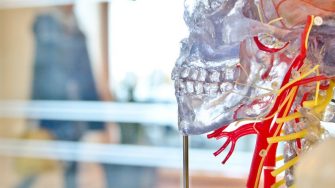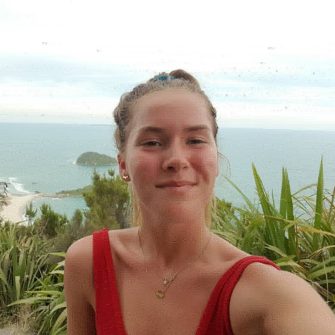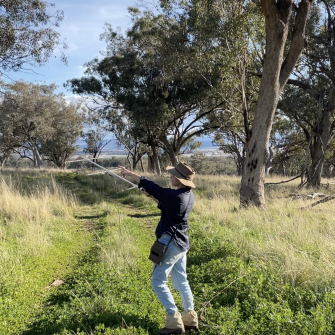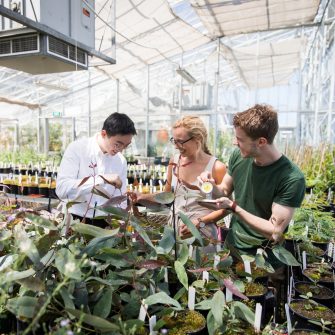Bachelor of Science / Education (Secondary)
- Commencing Terms
- Term 1 & 3
- Duration
- 4 Year(s)
- Delivery Mode
- Face-to-face (includes blended)
- Campus
-
Kensington
- Codes
- UAC code 422110
- Program code 4076
- CRICOS code 075263A
-
ATAR/2025 lowest selection rank
- 80.0 View all admission criteria
-
2026 Indicative first year full fee
- $7,000*
-
2026 Indicative full fee to complete degree
- $27,000*
-
2026 Indicative first year full fee
- $58,000*
-
2026 Indicative full fee to complete degree
- $245,000*

Application closures for 2026
International applications for all undergraduate programs, as well as postgraduate programs offered by the faculties of Arts, Design & Architecture, Engineering (excluding Master of Information Technology and associated programs) and Science are now closed to New Overseas Student Commencement (NOSC) for 2026 intakes.
Postgraduate programs offered by the Business School and the faculties of Law & Justice and Medicine & Health remain open. Master of Information Technology (and associated programs) also remain open.
- Overview
- Entry requirements
- What will I study?
- Future careers
- How to apply
- Fees & Scholarships
Bachelor of Science / Education (Secondary) overview
The UNSW Bachelor of Science / Education (Secondary) is a four-year double degree designed for intending secondary school science and mathematics teachers. You’ll combine studies in science or mathematics with both the theoretical and practical foundations of teaching, developing the skills to pursue a rewarding and highly employable career in secondary education.
Throughout your studies, you’ll explore STEM education, teacher training and curriculum design, while learning how to translate complex scientific concepts into engaging classroom lessons. In your final year, you’ll complete 80 days of supervised teaching practice in secondary schools, building the real-world experience and classroom confidence needed to succeed as a teacher.
After graduation, you’ll hold a professional teaching qualification recognised by the NSW Education Standards Authority (NESA), alongside a flagship Bachelor of Science degree from UNSW Science – one of Australia’s leading science faculties.
Why study science and education at UNSW?
Join the forefront of scientific discovery, innovation and research
As a global top 20 university (QS World University Rankings, 2024–2026), UNSW is shaping the next generation of STEM educators in Australia and beyond.
Through the Bachelor of Science / Education (Secondary), you’ll study within UNSW Science – one of the world’s most respected science faculties – and gain the knowledge, teaching skills and research-led insight to inspire future innovators.
UNSW Science is ranked in the global top 50 for nine subjects (QS World University Rankings by Subject, 2025).
- Ranked =#32 globally for psychology
- Ranked #44 globally for natural sciences
- Ranked =#49 globally for chemistry
- Ranked =#37 globally for earth and marine sciences
- Ranked #38 globally for environmental sciences
- Ranked =#28 globally for geology
- Ranked #31 globally for geophysics
- Ranked #48 globally for mathematics
- Ranked #27 globally for materials science
Additionally, UNSW is #1 in Australia for research output in physical sciences and #2 in Australia for research output in earth and environmental sciences, and chemistry (Nature Index Institution Outputs, 2024). UNSW also holds the #1 global rating for education research (Excellence in Research Australia).
Get hands-on experience and grow your professional network from day one
At UNSW, you’ll balance theory and practice to develop the confidence and capability to teach in real classrooms. Our career-focused approach has earned UNSW the title of Most Employable students for seven years in a row (Australian Financial Review (AFR) Top100 Future Leaders Awards, 2020–2026).
You can join the STEM Career Launchpad – an extra-curricular program that helps you explore STEM education careers, develop employability skills and build your professional network. You’ll also have the opportunity to leverage UNSW’s school and industry partnerships to gain part-time or casual teaching experience while you study, helping you transition seamlessly into full-time teaching after graduation.
Connect with a diverse community and transform ideas into impact
At UNSW, you’ll join a diverse, future-focused community of students, academics and professionals who are shaping the future of STEM education. From peer mentoring and student support services to more than 300 clubs and societies, you’ll connect with open-minded peers and educators whose perspectives will expand your worldview and inspire your teaching practice.
Want to see more from UNSW Arts, Design & Architecture?
What are the entry requirements for the Bachelor of Science / Education (Secondary) at UNSW?
-
- The 2025 Lowest Selection Rank (LSR) is the adjusted rank (ATAR plus adjustment factors) you would have needed to gain entry to this degree in 2025.
- The 2025 A levels score is based on four Advanced Level (A2) subjects. Entry scores are calculated from the best three or four A2 subjects (excluding repeated subjects) using the following values: A*=6, A=5, B=4, C=3, D=2, E=1. At most one Applied A Level subject may be included in the best four subjects used to calculate the aggregate.
- The 2025 IB Diploma is an indication of the IB you would have needed to gain entry to this degree in 2025. It is to be used as a guide only.
- The 2025 Lowest ATAR is the lowest ATAR (before adjustment factors were applied) to which an offer was made. Where <5 is listed, this indicates that less than 5 ATAR-based offers were made and so the score has not been published. N/A indicates no offers were made on the basis of ATAR.
*The Lowest ATAR to which an offer was made, for this program, is based on a UNSW Gateway Early Conditional Offer.
-
At UNSW, we are committed to ensuring prospective students have all the information they need in order to make informed decisions about their study options.
To assist you in gaining a better understanding of how Admissions works at UNSW, we have provided you with a summary of ATAR offers and the student profile.
We hope this information will help you identify the degree that is right for you.
Assumed knowledge
For Science component: Mathematics Advanced or Mathematics Extension 1 (depending on chosen area of study) plus one or more of Biology, Chemistry, Earth and Environmental Science, Physics. For Education (Secondary) component: Any 2 units of English (Band 5)
Adjustment Factors
We offer a range of adjustment factor schemes that reward students for academic performance and extra-curricular achievements. These schemes also take into account a range of personal and educational disadvantages that may have affected your studies.
HSC Plus
This scheme rewards students who perform well in Year 12 subjects that are relevant to their preferred UNSW degree. You may be awarded up to five points.
Elite Athletes, Performers and Leaders (EAPL)
This program recognises achievements in the areas of sport, academia, leadership and music at an elite level. You may be eligible for up to five points.
Educational Access Scheme (EAS)
Factors such as illness, financial hardship, language difficulties or attending a particular school can mean you don't always get the best possible marks in Years 11 and 12. If one of these situations applies to you, submit an application for the Educational Access Scheme (EAS) via UAC. Eligible students can receive between 1 and 10 points towards their chosen UNSW degree.
Admission pathways
Your ATAR is not the only measure of your potential to succeed, which is why we offer a range of pathways into university. Explore your options below and get in touch with our Future Student Advisers to discuss your path to UNSW.
Gateway Admission Pathway
This scheme is open to students who attend Gateway schools, live in a low-socioeconomic area based on IEO index of SEIFA criteria, are Aboriginal and/or Torres Strait Islander, or hold an eligible humanitarian or protection visa. This pathway provides early offers and early conditional offers with a reduced ATAR entry requirement for your preferred UNSW degree.
Entry programs for Australian Aboriginal and Torres Strait Islander people
We offer entry programs for Indigenous Australians, including the Indigenous Preparatory Programs and the Indigenous Admission Scheme (IAS). The entry pathway program you apply for will depend on the degree you want to study.
English language requirements
You may be asked to provide evidence of your English proficiency to study at UNSW depending on your educational background and citizenship. English language skills are vitally important for coping with lectures, tutorials, assignments and examinations - this is why UNSW requires a minimum English language competency for enrolment.
If you’re completing an Australian Year 12 qualification (e.g. NSW HSC or equivalent), you do not need to provide anything extra to prove your proficiency. Your qualification will be used as evidence of your English proficiency.
If you do need to provide evidence of your English proficiency, this will be indicated in your application. You can prove this by providing evidence that you meet one or more of the following criteria:
- English language tests and university English courses
- Prior study in the medium of English
- Other qualifications
If you need to improve your English skills before you start your degree, UNSW College’s Academic English Programs are for you. The programs are suitable for various English levels and help you prepare for university studies and life in Australia.
For more details, visit the English Language Requirements page.
International direct entry
Information for applicants with CBSE, HKDSE or Singapore A Levels Qualification
Calculating your CBSE Score:
Awarded by CBSE, average percentage marks across English or Hindi, and your best four remaining subjects. Where marks are given as a range, the mid-point for that range is used e.g. 75 to 80 = 77.5.
Calculating your HKDSE Score:
Entry requirements are based on the aggregate of the best 5 achieved category A subjects (category B and C subjects are not considered).
For subjects other than Citizenship and Social Development: level 5**=7 points, level 5*=6 points, level 5=5 points, level 4=4 points, level 3=3 points, level 2=2 points, level 1=1 point, Level U=0 point.
For subject Citizenship and Social Development: Attained=2 points, Unattained=0 point. Citizenship and Social Development will only be counted towards the aggregate if the 2 points awarded for Attained ranks among the student’s best five scoring subjects.
If Mathematics Compulsory Part and Extended Part (Module 1 or 2) are both presented, both scores can be counted.
Calculating your Singapore A Levels:
Due to significant changes to the GCE A-Level Curriculum and University Admissions Score (UAS) calculation effective 2026, UNSW assessment is currently under review.
Note: Entry requirements published on this page are correct as of the day of publication and may change without notice.
We do not accept secondary qualifications from this country. We may accept tertiary study results, please contact us for more information.
Please contact us for direct entry requirements.
Admission pathways
If you do not meet the requirements for direct entry into your chosen degree, you may be eligible for a pathway program with UNSW College. UNSW College provides alternative entry options using university-approved content so that you can start your UNSW journey with confidence.
English language requirements
You may be asked to provide evidence of your English proficiency to study at UNSW depending on whether you are from an English-speaking background or non-English speaking background. English language skills are vitally important for coping with lectures, tutorials, assignments and examinations - this is why UNSW requires a minimum English language competency for enrolment.
If English is not your first language, you’ll need to provide proof of your English proficiency before you can be given an offer to study at UNSW. You can do this by providing evidence that you meet one or more of the following criteria:
- English language tests and university English courses
- Prior study in the medium of English
- Other qualifications
If you need to improve your English skills before you start your degree, UNSW College’s Academic English Programs are for you. The programs are suitable for various English levels and help you prepare for university studies and life in Australia.
For more details, visit the English Language Requirements page.
Check the specific English language requirements for this program
What will I study in the Bachelor of Science / Education (Secondary)?
The Bachelor of Science / Education (Secondary) is a double degree that you can complete in four years with full-time study. You’ll complete a minimum of 192 units of credit (UOC) through a combination of majors, minors and electives.
Science coursework
In your Bachelor of Science, you’ll gain a broad foundation in scientific knowledge suitable for educators. You’ll study core subjects such as mathematics, biology and chemistry, while choosing from nine majors, including biology and biodiversity, chemistry, genetics and advanced physics.
You’ll also be empowered to lead your learning with SciConnect, an innovative online system that’s integrated across your whole science degree. It will be there to help you settle into university, track your professional development and showcase your skills to future employers.
Education coursework
In your Bachelor of Education, you’ll study a blend of theory and practical teaching that covers educational psychology, pedagogy, assessment and classroom management, as well as diversity, inclusivity and Indigenous perspectives. By your second year, you’ll have developed essential classroom skills and gained hands-on teaching experience, setting you up for success in your professional placements and future teaching career.
Full program structure
Your double degree consists of:
96 units of credit from Science, including:
- Five core courses (orientation, graduate portfolio and three employability experience courses)
- At least one Science major
- Science elective courses (if required)
96 units of credit from Education (Secondary), including:
- Core Education subjects
- Prescribed Education method electives
- Prescribed Education electives
-
Study life science and explore how organisms function, grow, evolve and relate to their environment.
Chemistry
Explore chemistry, from subatomic particles to spectacular phenomena, the field offers vast opportunities.Ecology and Conservation
Explore how various organisms interact with one another and their environment.Geography
Explore Earth’s landscapes, and environments to understand how they function and change over time.Explore pure mathematics, applied mathematics, statistics and computing while preparing for an education career.
Pathology involves studying diseases at genetic, molecular, cellular and organ levels. Contrary to popular belief, it’s not solely about blood tests.
Physics
Physics explores the laws governing the universe, from subatomic particles to galaxies. It applies these principles to practical and theoretical challenges.Physiology
Physiology studies how the human body functions, including organ processes, growth, maintenance and responses during disease and ageing.*Only students enrolled concurrently in both a Bachelor of Science and Bachelor of Education program may take the Mathematics for Education major.
Sample program
Below is an example of your study options in a standard four-year, full-time study plan.
| First year | Second year | Third year | Fourth year |
|
|
|
|
What careers can I pursue with a Bachelor of Science / Education (Secondary)?
As a graduate of the Bachelor of Science / Education (Secondary), you’ll be qualified to become a secondary school teacher specialising in science or mathematics. This double degree gives you the NESA-accredited teacher training and hands-on classroom experience to inspire the next generation to explore their skills and passion in science, technology, engineering and maths (STEM).
This double degree can also lead to a wide range of non-teaching roles across Australia’s growing STEM industries. Graduates with science and education qualifications are sought after for their analytical thinking, communication and problem-solving skills, working in sectors such as professional, scientific and technical services, education, public administration, manufacturing and healthcare.
You could also pursue roles in science communication, curriculum design, education policy, STEM outreach or research and training. The scientific literacy and educational expertise you gain at UNSW will prepare you to contribute meaningfully to innovation and learning in a wide variety of settings.
Learn what it takes to become a teacher or explore our study areas below to discover the range of potential career paths available across science and education.
Our alumni
"Looking back at my time at UNSW, some of my fondest memories have been learning alongside friends. Having networks of teachers was super helpful throughout the degree and has continued forward to teaching now. It’s so helpful to know that others are navigating first year teaching with me."
Emma Warren
Senior Urbanist - Planning at Ethos Urban
Hear more about Emma's experience
Accreditation
This degree is accredited by NSW Education Standards Authority as an initial teaching qualification for both government and non-government secondary schools throughout Australia and is widely accepted as a teaching qualification internationally.
How to apply for the Bachelor of Science / Education (Secondary) at UNSW
Applications for undergraduate study from domestic students (Australian citizens, Australian permanent residents, Australian permanent humanitarian visa holders and New Zealand citizens) are processed by the Universities Admissions Centre (UAC).
Visit the Apply section of the UAC website and you can nominate up to five degrees in order of preference, with the first being your most desired degree and university.
On-time applications for admission usually close at the end of September each year for Term 1 admission. Late applications can be submitted, but a late fee will apply. For study starting in Term 1, the majority of offers are made in December and January. Visit the UAC website for key dates for admission outside of Term 1.
Ready to start your application?
For most international students, applications are submitted via our Apply Online service. We encourage you to submit your completed application as early as possible to ensure it will be processed in time for your preferred term.
Some high-demand programs with limited places, may have an earlier application deadline or may have an earlier commencement date. For details, visit the international admissions information page.
*If you are an international student studying an Australian qualification, go to the Universities Admission Centre (UAC) for application and UAC key dates. Note: If you are under 18 years of age, you need to make special arrangements. For details, visit the under 18 international students page.
Ready to start your application?
Bachelor of Science / Education (Secondary) fees and scholarships
Commonwealth Supported Place: Student Contribution Band 2
*The student contribution for a Commonwealth Supported Place is an indication only of the amount payable in Year 1 based on a standard full-time load of 48 credit points (1.0 EFTSL). The actual student contribution you will be liable for depends on your individual program of study and the calendar year in which you enrol. Actual fees are calculated upon enrolment. Student contribution amounts are subject to annual review by the university and may increase each year during your studies (subject to caps determined by the Australian Government), effective at the start of each calendar year.
The indicative fees listed here are based on an estimated average and are for tuition only - other fees and charges are not included.
*Fees are subject to annual review by the University and may increase annually, with the new fees effective from the start of each calendar year. The indicative fees listed here are based on an estimated average and are for tuition only, other fees and charges are not included. The amount you pay will vary depending on the calendar year to enrol, the courses you select and whether your study load is more or less than 1 Equivalent Full Time Student Load (8 courses per year).
Indicative fees are a guide for comparison only based on current conditions and available data. You should not rely on indicative fees. More information on fees can be found at the UNSW fees website.
Indicative fees to complete the program have been calculated based on a percentage increase for every year of the program. Fee increases are assessed annually and may exceed the indicative figures listed here.
Indicative fees to complete the program include tuition plus an estimate of study-related costs of approximately $1,000 per year. To find out more about other costs, visit UNSW International.
Scholarships
At UNSW, we award over $83 million in scholarships each year. We pride ourselves on rewarding excellence and making university accessible to students from all walks of life. Whether you’re a domestic or international student, our range of scholarships, prizes and awards can support your journey.
Progress starts here – at a world-leading university

Top 20 Worldwide
UNSW is ranked #20 university in the world
QS World University Rankings, 2024–2026

Most Employable Graduates
Winner of the AFR Most Employable University Award seven years in a row
AFR Top100 Future Leaders Awards, 2020–2026

Australia's #1 for Innovation
Highest number of startups and spinouts from university-developed tech
SCOPR report, 2024






